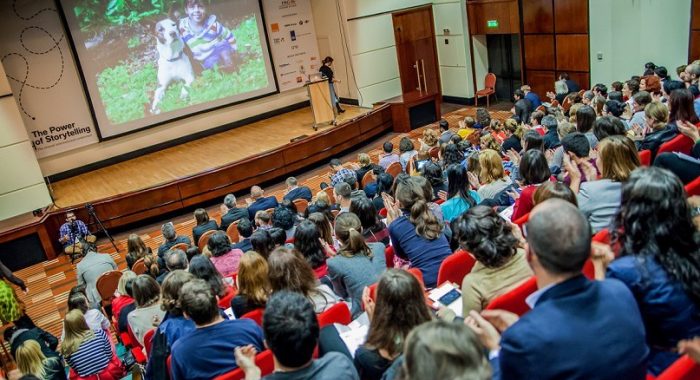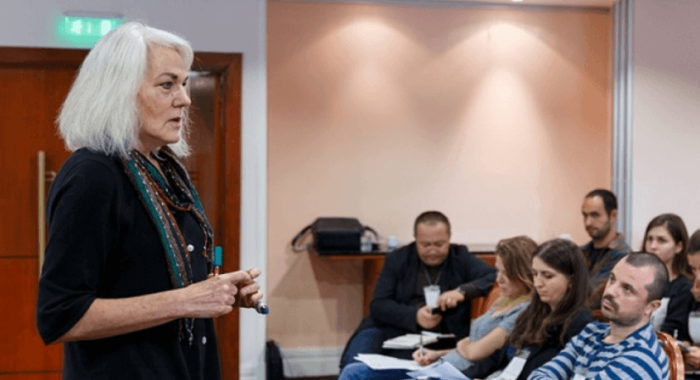After two days of storytelling wisdom in Bucharest, we moved to Cluj for an afternoon of stories with Cristian Lupsa, editor of Decât o Revistă magazine, Mircea Tomescu, communication specialist, and Jacqui Banaszynski, Pulitzer Prize-winning reporter, editor, and coach.
Here’s what they talked about on a rainy afternoon, in front of 200 people:
• Cristian Lupșa opened the evening with a talk about the power of “Once upon a time” stories, and listed some of the reasons why telling them is important:
- To convince: “Think about how many stories we hear every day from people who try to convince us to believe them, to vote for them, to see a movie or to listen to a song.”
- To lead. Companies or brands can do that by telling real stories, of real people using their products and how it matters in their lives, instead of making statements like: we believe in customer service.
- To explain: “We often try to explain complicated stories through smaller, more humane stories. For example, how do you collect signatures for a Presidential election campaign or how do you raise a new generation of footballers?”
Suntem programati sa raspundem lumii in povesti, @cristianlupsa la #story14
— Anne-Marie Chelariu (@the_Anne_Marie) October 23, 2014
- To create emotion – sometimes a story can help you connect with yourself and your own emotions better, relate to a certain moment in your life.
5. To connect with others
Arunci o #poveste în lume și poți agăța ceva, poți atinge un om care nici nu știa că avea nevoie de așa ceva. @cristianlupsa la #Story14
— Decât o Revistă (@decatorevista) October 23, 2014
• Mircea Tomescu then talked about the role of modern myths in creating brand related stories and about how these stories can transform our identities. „Every brand has its own mythology, created based on simple values: Mercedes says perfection, Nike says courage, Amnesty International says justice; Guiness says: have a little patience and you’ll enjoy a good beer at the end.” He then talked about the dangers that can appear when we’re embracing these brand stories and projecting their identities upon us:
- The obsession of brands with democratization: „People can be very changeable, they can move within several values, but brands can’t do that, they need to be stable. Amnesty International can’t be both about justice and rebellion; Mercedes can’t be about affordable quality. And what happens is that a lot of brands start running after people’s inconsistency, a good example being Porsche Cayenne”
- The second danger concerns us. „Somewhere between this new identity we’re projecting and our own identity, we get lost. Between I became a writer because I bought a Mont Blanc and now I’m mostly signing contracts, but what a good writer I could have been”.
Ce ne place la branduri e că au făcut mitologiile accesibile. Poți să îți proiectezi identități pe care nu le ai. pic.twitter.com/4g9VG2qNgu — Decât o Revistă (@decatorevista) October 23, 2014
- Brands can’t pave the way to happiness. „Their job is to show you the choices you have to make at some point. But there is no way to happiness. When you see advertising campaigns that tell you that, they’re a joke.”
The conclusion and advice he gave at the end was: „I’m not saying brands are the only stories you tell about yourselves, but it’s a lot of that. It’s important that you don’t get lost between the identities projected by brands and your own identities, between your projections and your choices.”
• Jacqui Banaszynski ended the evening with an emotional speech about the doubts and challenges all journalists face in their careers, and about why this kind of work, when done well, matters.
„Think about how you go through your life, how you rememeber your past, how you shape your dreams, how you imagine your future, how you communicate, learn and share, how you make meaning to this messy wnonder that is life: you create stories. You create meaning by creating stories.”
Being a #journalist gives you an opportunity to live many, many lives. @JacquiB at #Story14 #Cluj pic.twitter.com/ZxFZ3KsBRY
— The Power of Story (@pofstorytelling) October 23, 2014
Stories are essential no matter what field we’re in, she added, giving examples of doctors who help people face the end of their lives by writing their narrative, or business leaders telling their public the story of who they want to be. She then named a few essential lessons that apply to al creative people that want do to be successfull:
- Have an idea, a dream or a vision. “For me, that idea comes through intense curiosity”
- Gather the raw material to serve your idea. “Learning the craft and doing the work, that’s the hard stuff. In journalism we call it reporting, but it’s not different than a marathon runner who wants to get to the finish and knows they have to take it step by step. Part of that is the discipline of patience.”
- Build something that serves others. “Once you’ve mastered craft and done the word, you go back to your goal, but with purpose, you make something that has value to others, it’s no longer just about you. For me, it’s writing a story that others relate to, getting people close to something they can’t see in person, maybe get them to see it with new eyes, with a new perspective.”
- Make your ambition about the value of the work that adds up to more than money. My stories have given me much more – as a child, they helped me escape from a tiny village; as a career, they gave me a sense of adventure and the chance to meet all of you”.


